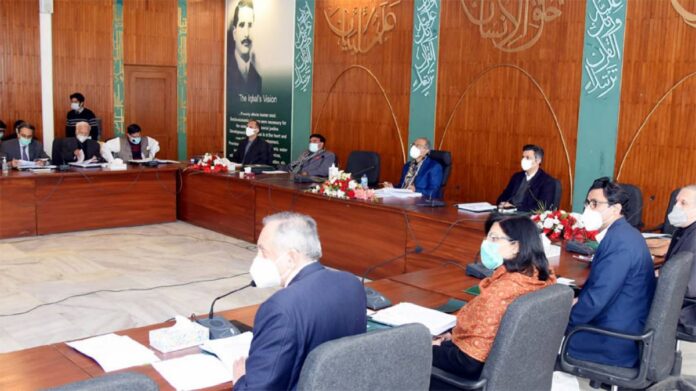ISLAMABAD: The Economic Coordination Committee (ECC) of the Cabinet has granted exemption of Public Procurement Regulatory Authority (PPRA) rules for importing urea.
A handout issued by the Economic Affairs Division (EAD) in this regard on Monday stated that the EAD Federal Minister Omar Ayub Khan chaired the ECC meeting and took several important decisions.
As per details, the ECC, on the summary of the Ministry of Industries and Production, granted PPRA rules exemption to Trading Corporation of Pakistan (TCP), for republishing the tender till fetching a low price during the Rabi session 2021-22 (FY22).
Presently, urea is selling at Rs2,100 per bag in the market whereas the factory rate is approximately Rs1,750. DAP fertiliser is available above Rs9,000 per bag while the factory rate is around Rs8,250.
Sources said that small farmers were facing hurdles due to the surge in prices of urea and DAP while most of them, despite having a Kissan Card, were unable to get the subsidy announced by the federal and Punjab governments.
On the other hand, the Agriculture Department of Punjab was not clearing subsidy files due to which there were chances that small farmers would not cultivate wheat in this season.
It is pertinent to mention here that the federal cabinet, in its last meeting, had constituted a sub-committee to determine the minimum support price (MSP) for the wheat crop of 2021-22 (FY22) as the Ministry of National Food Security and Research (MNFS&R) had recommended Rs2,180 MSP to meet the production target of 29 MMT.
Earlier in October, the fertiliser industry had requested the federal government for a complete deregulation of the sector without gas subsidies or any other benefits because urea manufacturers are competitive internationally and can operate without any government support.
Moving on to other agenda items, the ECC also deliberated over a summary presented by the Ministry of Industries and Production on Small and Medium Enterprises (SMEs) policy 2021-25.
The policy framework is based on reforming the policy and regulatory environment and addressing SME market constraints, both demand and supply side.
The meeting approved Technical Supplementary Grants (TSGs) worth of Rs10 billion during FY22 under the Sustainable Development Goals Achievement Programme (STGAP).
In addition, the chair also approved TSG worth of Rs134.783 billion for the payment of 60 per cent second installment to IPPs and Rs338 million during FY22 in favour of the National Rahmatul-lil-Alameen Authority (NRA), and Ministry of Federal Education and Professional Training.
Moreover, funds of Rs5.85 billion in favour of Housing and Works to execute development schemes in Sindh and Balochistan Provinces under (SAP), Rs1.08 billion from PSDP to Interior Division for further release to ICT Administration and rupee cover budget against $200 million out of $500 million committed by ADB for the procurement of Covid vaccine and ancillary goods and services were also approved.
The ECC also approved Rs4.785 billion in favour of the ECP for conducting local government (LG) elections in all provinces and for periodical revision of electoral rolls.
Earlier, Adviser to Prime Minister on Finance and Revenue Shaukat Tarin, presided over the Technical Advisory Committee (TAC) meeting of the ECC. Federal Minister for National Food Security and Research Syed Fakhar Imam, Federal Minister for Industries and Production Makhdoom Khusro Bakhtiar, Federal Secretaries and other senior officers participated in the meeting.




